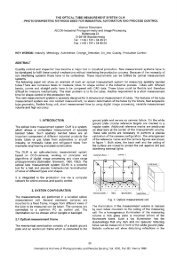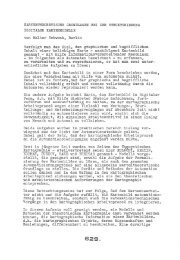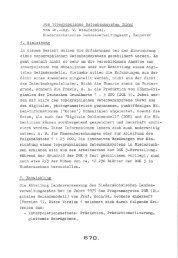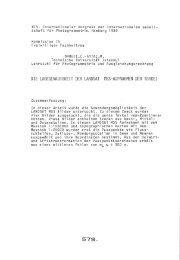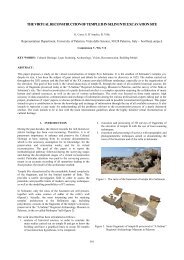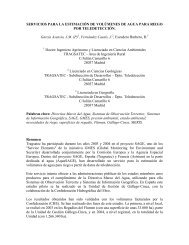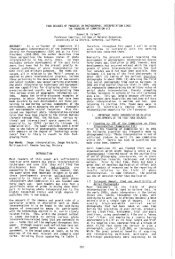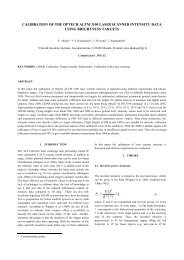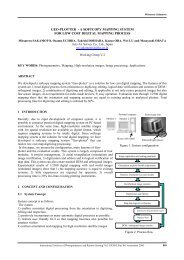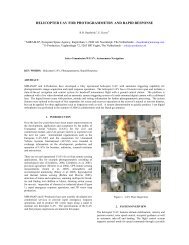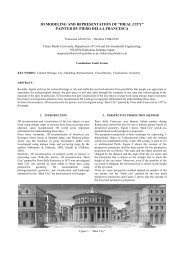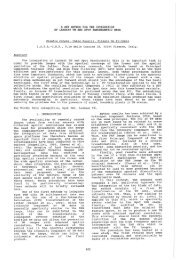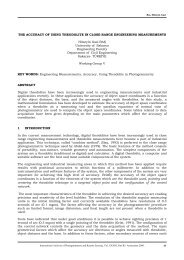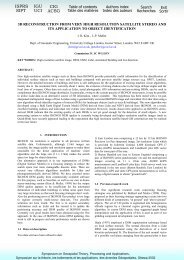Geoinformation for Disaster and Risk Management - ISPRS
Geoinformation for Disaster and Risk Management - ISPRS
Geoinformation for Disaster and Risk Management - ISPRS
You also want an ePaper? Increase the reach of your titles
YUMPU automatically turns print PDFs into web optimized ePapers that Google loves.
Alternatively, technical advice to national institutions<br />
may also be provided by other means such as<br />
bilateral meetings, telecommunication, video<br />
conference, or by facilitating direct cooperation<br />
between the national institution <strong>and</strong> providers of<br />
space-based in<strong>for</strong>mation.<br />
Up to March 2010, UN-SPIDER has carried out<br />
<strong>for</strong>mal Technical Advisory Missions to Burkina Faso,<br />
Ecuador, the Dominican Republic, Fiji, Ghana, Haiti,<br />
Jamaica, Namibia, Samoa, <strong>and</strong> Togo.<br />
Capacity-building<br />
Capacity-building ef<strong>for</strong>ts are essential <strong>for</strong> UN-<br />
SPIDER to fulfil its mission in developing countries.<br />
Capacity-building goes beyond training of<br />
individuals, <strong>and</strong> includes the strengthening of<br />
institutional frameworks <strong>and</strong> procedures. Shortterm<br />
training programmes target specific contents,<br />
such as particular tools or processes, with the aim of<br />
strengthening the capacity of individuals. Long-term<br />
activities are tailored to enhance capacities of<br />
agencies or to enhance the synergies among them.<br />
Activities in this component include workshops <strong>and</strong><br />
exercises (2- 5 days), short, intensive training events<br />
(spring or summer schools, block courses, 1- 3<br />
weeks), <strong>and</strong> courses (one to several months).<br />
Workshops will target very specific topics <strong>and</strong> will be<br />
structured in such a way that they concentrate on<br />
specific skills. In a similar fashion, contingency <strong>and</strong><br />
near-real-time exercises will be set up with realistic<br />
scenarios in mind to complement other training<br />
activities.<br />
Short, intensive training events (<strong>for</strong> example spring<br />
<strong>and</strong> summer schools or block courses) will include<br />
lectures as well as h<strong>and</strong>s-on training on basic space<br />
technology utilization, GIS, interpretation <strong>and</strong><br />
visualization of spatial data, <strong>and</strong> applications via<br />
examples <strong>and</strong> case studies.<br />
Courses will provide an overall view to use spacebased<br />
in<strong>for</strong>mation <strong>for</strong> disaster <strong>and</strong> risk management,<br />
targeting the use of this in<strong>for</strong>mation <strong>for</strong> a variety of<br />
hazards <strong>and</strong>, in the case of emergency response,<br />
addressing not only the use of in<strong>for</strong>mation, but also<br />
other spatial applications such as GNSS <strong>and</strong> satellite<br />
communications.<br />
Training activities are carried out through the<br />
network of Regional Centres on Space Science <strong>and</strong><br />
Technology Education affiliated to the United<br />
Nations, as well as other Centres of Excellence such<br />
as the International Institute <strong>for</strong> Geo-In<strong>for</strong>mation<br />
Science <strong>and</strong> Earth Observation (ITC) in the<br />
Netherl<strong>and</strong>s, the Asian Institute of Technology (AIT)<br />
in Thail<strong>and</strong>, the University of Salzburg Centre <strong>for</strong><br />
Geoin<strong>for</strong>matics (Z_GIS) in Austria, <strong>and</strong> with the<br />
support of space centres such as the German<br />
Aerospace Center (DLR).<br />
The capacity-building ef<strong>for</strong>ts are coordinated with<br />
the support of the Regional Support Offices <strong>and</strong><br />
National Focal Points, <strong>and</strong> with other regional <strong>and</strong><br />
international organizations such as the International<br />
Strategy <strong>for</strong> <strong>Disaster</strong> Reduction (ISDR); the Group on<br />
Earth Observations (GEO); United Nations agencies,<br />
such as the UN Office <strong>for</strong> the Coordination of<br />
Humanitarian Affairs (UNOCHA), the World<br />
Meteorological Organization (WMO), the United<br />
Nations Development Programme (UNDP) <strong>and</strong> the<br />
United Nations Educational, Scientific <strong>and</strong> Cultural<br />
Organization (UNESCO); <strong>and</strong> regional organizations<br />
targeting risk reduction <strong>and</strong> emergency response<br />
such as the Coordinating Centre <strong>for</strong> the Prevention of<br />
Natural <strong>Disaster</strong>s in Central America (CEPREDENAC)<br />
<strong>and</strong> Caribbean <strong>Disaster</strong> Emergency Response<br />
Agency (CDERA) in the American hemisphere; the<br />
Asian <strong>Disaster</strong> Preparedness Center (ADPC) <strong>and</strong> the<br />
Asian <strong>Disaster</strong> Reduction Centre (ADRC) in Asia; <strong>and</strong><br />
the International Federation of the Red Cross <strong>and</strong><br />
Red Crescent Societies (IFRC).<br />
The UN-SPIDER Knowledge Portal: A Webbased<br />
Plat<strong>for</strong>m <strong>for</strong> In<strong>for</strong>mation <strong>and</strong><br />
Communication<br />
What is the Knowledge Portal?<br />
The Knowledge Portal is UN-SPIDER's response to<br />
the need <strong>for</strong> a comprehensive in<strong>for</strong>mation gateway<br />
to space-based in<strong>for</strong>mation <strong>for</strong> disaster management<br />
support. It is a web portal <strong>for</strong> in<strong>for</strong>mation,<br />
communication <strong>and</strong> process support <strong>and</strong> offers<br />
orientation <strong>and</strong> guidance, <strong>and</strong> provides updates on<br />
the latest UN-SPIDER activities. In<strong>for</strong>mation on<br />
SpaceAid <strong>and</strong> updates on current disasters is issued,<br />
as are reports about Technical Advisory Missions<br />
<strong>and</strong> UN-SPIDER workshops. Questions about<br />
availability, quality, accessibility <strong>and</strong> costs of spacebased<br />
in<strong>for</strong>mation are answered on the Portal.<br />
The portal is open to the public <strong>and</strong> anyone involved<br />
in the fields of disaster management <strong>and</strong>/or satellite<br />
technology. You are cordially invited to visit<br />
http://www.un-spider.org <strong>and</strong> register as a user.<br />
107



